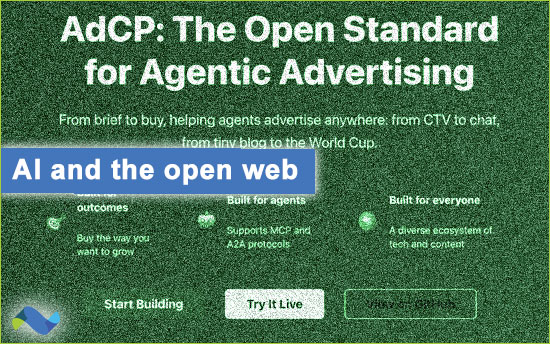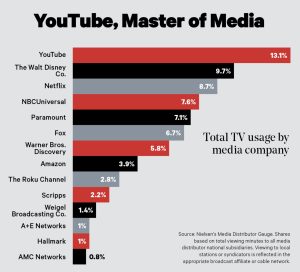A new protocol – Ad Context Protocol (AdCP) – was launched yesterday by a consortium of mostly ad tech companies to address the buying and selling of agentic-powered advertising.
See the video of yesterday’s webinar on YouTube. (October 15)
“Better set the standard before someone else does” appears to be at least part of the thinking. (i.e. the walled gardens)
AdExchanger’s James Hercher reported:
“The co-founding members include Triton Digital, Yahoo!, PubMatic, Scope3, Optable and Swivel, each committing time, resources, plus a $10,000 annual budget to back the new organization. Other launch members have committed to test with less time and financial commitments, PubMatic CRO Kyle Dozeman told AdExchanger.
‘What we’re seeing with the proliferation of AI across the advertising ecosystem is that agents need to be able to talk to each other, and they need to be able to interact,’ said Scope3 co-founder and COO Anne Coghlan during a preview and Q&A regarding the new organization.”
Read more on AdExchanger. (October 15)
Mr. O’Kelley wrote on his personal blog about the AdCP launch:
“For the past two months, more than 20 companies have been collaborating to build the first version of AdCP. It feels to me very similar to the early days of programmatic, when entrepreneurs were building foundational companies that today are household names. What’s different this time is that it’s not just startups: some of the largest publishers, platforms, agencies, and marketers are actively involved and helping to move agentic advertising forward.”
Read more on Mr. O’Kelley’s “BOK on Ads (and Climate)” blog.
A post on a new LinkedIn page called “Ad Content Protocol,” offered an explainer on AdCP which is built on Model Content Protocol (MCP) or Agent2Agent (A2A):
“Similar to how OpenRTB standardized real-time bidding for programmatic advertising, AdCP standardizes agent-to-agent communication for agentic advertising — creating a commmon language for AI agents operating across the ecosystem…”
More:
- The Universal Ads API Introducing AdCP: an open standard for agentic advertising (October 15) – Scope 3 CEO Brian O’Kelley on his Substack
- adcontextprotocol / adcp – GitHub
- AdCP Protocol website – adcontextprotocol.org
From tipsheet #1: Yesterday’s well-orchestrated “Agentic Advertising Standards & Community Launch” webinar made clear that Scope3 intends to lead the ad tech industry when it comes to agentic advertising standards and the company will manage development of the AdCP protocol.
Three of the eight speakers for the hour-long event were from Scope3 including CEO Brian O’Kelley. The impressive list of partners at launch speaks to Mr. O’Kelley’s gravitas in the industry as well as participants’ belief in Mr. O’Kelley’s vision.
Sources say that from a Scope3 business model perspective, Scope3 takes 6% as a buyer agent with the new protocol.
From tipsheet #2: As AdCP matures, it will be interesting to see when/if The Trade Desk, Amazon DSP and Google adopt AdCP. If it becomes a key way the buy- and sell-sides transact ads, why wouldn’t they?
Agency buy-in will be key, too. No agency holding companies were part of this first step.
Down the road, if OpenAI or Anthropic adopts the protocol in some way when they roll out advertising for their answer engines, it’s a home run. Actually, it’s a thousand home runs, a new Major League record.
LLMs & CHATBOTS
OpenAI opens to more users
OpenAI is getting closer to an ad-supported version of ChatGPT with the expanded rollout of a reduced-price subscription tier known as ChatGPT Go.
OpenAI head of ChatGPT Nick Turley announced on LinkedIn:
“We’re continuing to make ChatGPT Go — our most affordable subscription — available to more people around the world. It’s now live in 89 countries, across Africa, the Middle East, Central Asia, Asia, the Caribbean, and Latin America.
ChatGPT Go gives people access to some of our most popular ChatGPT features at a more affordable price — helping people supercharge their work, get creative, and explore new ideas.”
Read a bit more from Mr. Turley on LinkedIn. (October 15).
From tipsheet: OpenAI wants to cover costs as ChatGPT’s global footprint expands. But any price may be too much for millions of people in and outside of the United States. One can see the ChatGPT Go version becoming the “no ads”, entry level version of ChatGPT in the future.
LLMS & CHATBOTS
Developments
- Introducing Claude Haiku 4.5 (October 15) – Anthropic
- Anthropic aims to nearly triple annualized revenue in 2026, sources say (October 15) – Reuters
- A guide to the $1 trillion-worth of AI deals between OpenAI, Nvidia and others (October 15) – CNBC
BRANDS
AI affecting brand value
Brand consultancy Interbrand said that AI is having an impact on its latest global brand rankings report.
Marketing Dive summarized the brand valuation news from an AI perspective:
“In the case of AI, Nvidia remains the standout. The chipmaker, which only landed on the Interbrand rankings for the first time last year, climbed from the No. 36 spot to No. 15, making for the biggest gains the firm has ever recorded for a single business. The leap was attributed to ‘stellar product marketing and complete dominance’ by Greg Silverman, Interbrand’s global director of brand economics, although he cautioned that a disruptor could unseat Nvidia’s pole position if it does not invest in long-term brand strategy.”
According to Interbrand’s calculations, Nvidia’s brand value alone was up 116% year over year to $43.2 billion. Nvidia’s market cap is about 100x the brand value at 4.36 trillion as of yesterday.
Read more in Marketing Dive. (October 15)
Download Interbrand’s “Best Global Brands 2025” here. (email required)
SELL-SIDE
About that creator economy
Interview: YouTube CEO Neal Mohan on his $100 billion vision for YouTube’s future and the disruption it’s left in its wake. (October 15) – The Hollywood Reporter
TECH
Reaction: The Trade Desk’s OpenAds
In the wake of The Trade Desk’s roll-out of OpenAds, which seeks to create more supply-side transparency for buyers, industry reaction has been sharp -and voluminous.
Here’s a quick sample…
Scott Messer, consultant, Messer Media on LinkedIn (October 13):
“OpenAds is for DSPs and Prebid is for SSPs.
I predict that The Trade Desk’s OpenAds will spark an influx of direct-bid-DSP integrations that shift a majority of open auction spend away from SSPs in the current auctions. Left gasping for demand, Prebid will primarily support (and focus on) SSPs generating sell-side decisioning demand (aka curation). If executed correctly, TTD’s OpenAds has the potential to reshape the programmatic landscape, and set us up for an epic battle of SSP vs. DSP.
Welcome to the Auction Wars.”
Reactions to Mr. Messer’s post included…
Ari Paparo, Marketecture founder, technologist and author, commented on LinkedIn (October 15):
“Here’s the second order question I have. If you have DSPs bidding ‘honestly’, but SSPs bidding to intentionally increase yield, won’t the latter win more since they will manipulate the bids to win more auctions?”
Mike O’Sullivan, co-founder of The Trade Desk’s sincera, commented on LinkedIn (October 13):
“If the auction is honest and secure for buyers (dsps) why wouldn’t it also be that for SSPs? Are there some curation features only available within Prebid that wouldn’t be in OpenAds?
Let’s say you are an SSP doing curation, and competitor SSPs are doing curation AND a ton of request duplication.
Would you rather your curation be in a high trust environment with very low duplication, or in an auction where you need to keep increasing your costs (bid requests) —to infinity— maintaining ‘bid request share’ with other, duplicating SSPs?”
Read the entire thread of comments on LinkedIn. (October 15)
Separately, New Street Research analyst Dan Salmon wrote in a note to investors yesterday (October 15):
“Why [Amazon] matters to this conversation too: Competition from Amazon DSP remains the #1 controversy for [The Trade Desk] investors, and that conversation has generally been focused on [Amazon]’s growing list of inventory partners, especially in CTV and Audio, and we also think Amazon DSP’s improved capabilities have been closing a gap with [The Trade Desk].
But [Amazon]’s efforts to improve open web interoperability are also important signals of its strategy, and we think its moves in this direction are quite different from what we have seen from [Google] in the past. For example, Amazon Web Services – which has a growing advertising and marketing practice that sits outside of the core Amazon Ads business that includes the DSP – offers a deployment for the Prebid server, something we have never seen offered from Google Cloud (though Google Ads Manager – which is at the heart of the DOJ case — rolled out a closer integration with Prebid several years ago, background HERE).”
SEARCH
Longer queries in ChatGPT search
A new study from marketing agency Nectiv found that “ChatGPT performs a search in nearly one-third of prompts and averages more than two searches per query, each about 5.5 words long (roughly 60% longer than the typical Google search).”
More key findings about ChatGPT search according to Search Engine Land:
- “Search frequency: 31% of prompts triggered at least one search.”
- “Fan-out depth: ChatGPT averaged 2.17 searches per prompt, maxing out at four.“
- “Query length: 5.48 words on average – 77% of all the queries were 5 words or longer.“
- “Industries: ChatGPT searched most for local intent (59%); least for credit cards (18%) and fashion (19%).”
Read more. (October 15)
More: New Data Study: What Queries Is ChatGPT Using Behind The Scenes? (October 14) – Nectiv
From tipsheet: It seems likely Google Search is experiencing similar results with AI Overviews and AI Mode. Search is getting more effective and satisfying for the answer engine user. They just need some ads to pay for the experience.
MORE
- Music Lyrics Data Company Inks AI Licensing Deals With the Big Three Publishers (October 15) – Billboard
- How Publicis Group made AI pay off (October 15) – Digiday (subscription)
- AI writing hasn’t overwhelmed the web yet (October 14) – Axios
- Podcast: The Boston Globe sees quality convert as AI crushes clickbait (October 11) – Future Media on Apple Podcasts app


